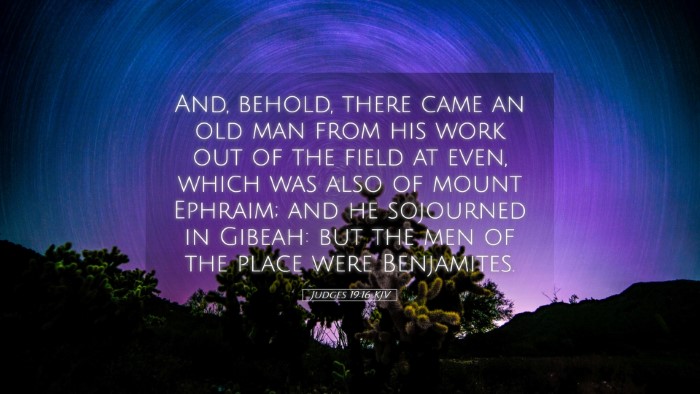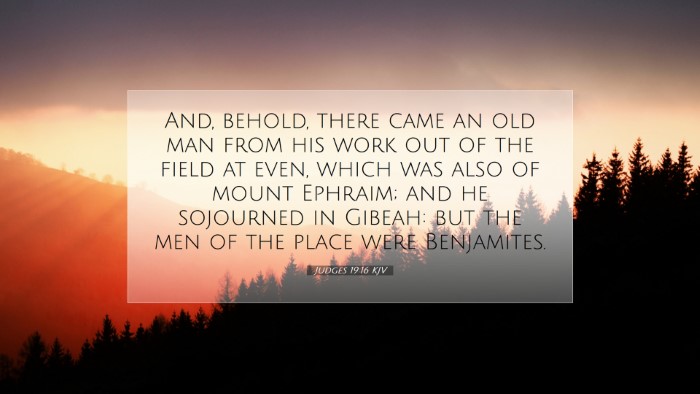Commentary on Judges 19:16
Judges 19:16 describes the arrival of a Levite and his concubine to a city in the territory of Ephraim. This verse sets the stage for one of the more tragic narratives in the book of Judges, highlighting themes of hospitality, moral decay, and societal sin. In examining this verse, insights from various public domain commentaries will provide a deep understanding of its significance within its historical and theological context.
Contextual Overview
The book of Judges serves as a historical account of Israel during a turbulent period when they were governed by judges rather than a centralized monarchy. The story in Judges 19 illustrates moral decline and reflects the chaotic state of society, especially pertaining to hospitality norms and inter-tribal relations.
Commentary Insights
Matthew Henry's Commentary
Matthew Henry emphasizes the Levite's travel towards the city of Ephraim noted in this verse. He notes that the Levite's journey represents more than mere physical relocation; it portrays a seeking of fellowship in a fractured societal landscape. This Levite, representing the priestly tribe, was, ironically, in search of better conditions but ends up encountering the depths of moral failure in Israel's society.
-
Hospitality's Importance: Henry underlines the traditional expectation of hospitality, showing that the dynamics around the Levite’s arrival were not just accidental but were reflective of a critical societal expectation. The lack of such hospitality among the Israelites signifies a serious moral failure.
-
The Role of the Levite: He elucidates that as a Levite, the man was expected to uphold a higher standard of living and conduct. His journey, thus, highlights the contrast between his expectations and the reality he faced, hence serving as a commentary on the spiritual state of Israel.
Albert Barnes' Commentary
Albert Barnes provides insight into the significance of the Levite's approach to the city. He notes that the Levite's actions and decisions are critical in understanding the unfolding tragedy. By arriving in this specific region, he not only seeks refuge but also indicates a broader longing for community that ultimately results in failure.
-
Cultural Implications: Barnes points out the cultural implications of the Levite’s search for a place of rest. His arrival scope into the broader context of declining values, where hospitality — which was valued in ancient Near Eastern customs — is absent, foretelling the events that precipitate the subsequent moral crisis.
-
Urban vs Rural Dynamics: He also explores the contrasts between urban and rural life, hinting that the Levite’s urban expectations clashed with the realities of the rural people, thus setting the foundation for understanding the societal conflicts.
Adam Clarke's Commentary
Adam Clarke broadens the theological dimensions of the passage. He suggests that Judges 19:16 serves as a lens that reflects the entirety of Israel's spiritual declination. Clarke approaches the narrative with an understanding that hospitality, or lack thereof, can have theological ramifications on a community's standing before God.
-
Moral Decline: Clarke emphasizes the broader theme of moral decay seen in the attitudes of the people. The Levite, a religious figure, ironically finds no accommodation, presenting a dramatic irony in the narrative. This serves as a potent reminder of Israel's state, abandoning the societal obligations of kindness and care.
-
Reflection on Leadership: He articulates that the Levite represents leadership but also exhibits the flaws inherent in human judgment. The choice to stay in a city marked by depravity rather than retreating reflects a critique of spiritual leaders in Israel at this time.
Theological Reflections
The implications of Judges 19:16 extend beyond the immediate narrative, prompting reflection on several theological themes.
-
Hospitality as a Virtue: The lack of hospitality represents a significant moral failing in Israel. This virtue is not only a social expectation but also a divine command seen throughout the Scriptures, calling believers to a higher standard of love and care for others.
-
Human Nature and Sin: The Levite’s journey can be seen as a metaphor for humanity's continual quest for fulfillment, often ending in disillusionment amidst societal decay. This passage serves as a reminder of the human propensity towards sin and the need for divine intervention.
-
Warnings for the Church: For contemporary pastors and theologians, this passage serves as a poignant warning about the potential consequences of failing to uphold ethical standards within the community. The narrative urges vigilance against declining moral standards in both society and church.
-
Role of Leaders: The Levite’s inaction and decision-making underscore the critical role of leaders in shaping community values. Leaders are expected to demonstrate righteousness and moral courage amidst societal challenges and decline.
Conclusion
Judges 19:16 contains multilayered insights into the spiritual and ethical decay experienced by Israel during the time of the judges. Through the lens of hospitality, societal expectations, and moral responsibilities, this verse serves as a significant commentary on the human condition. By examining the insights from Matthew Henry, Albert Barnes, and Adam Clarke, modern readers — especially pastors, students, and theologians — can glean valuable lessons on the importance of upholding moral and ethical standards in their communities. As we reflect on this narrative, may we be mindful of our responsibilities in fostering an environment that embodies the love and care exemplified in Scripture.


